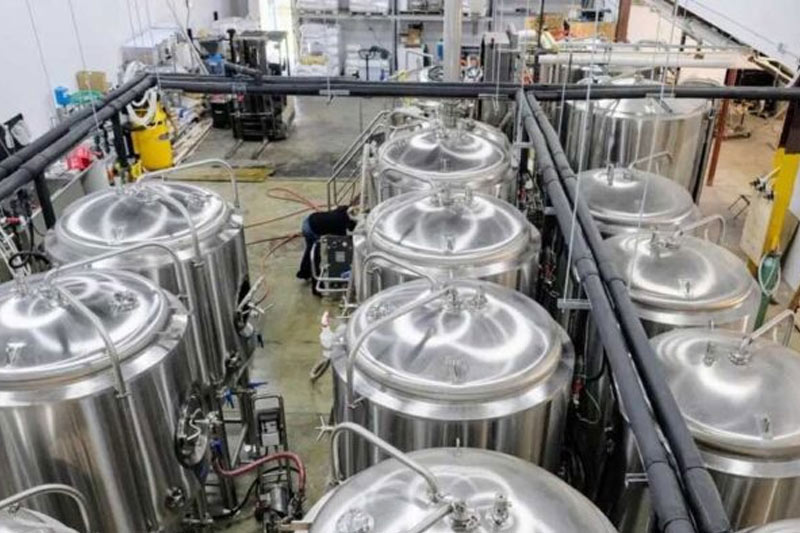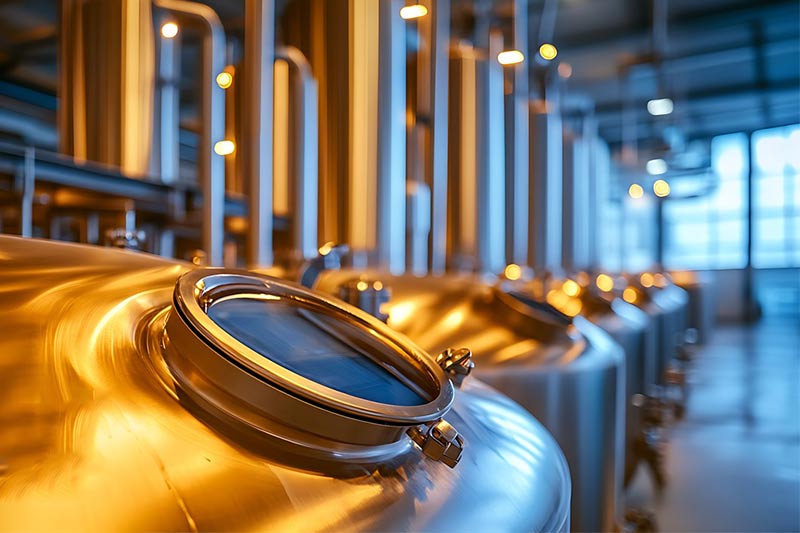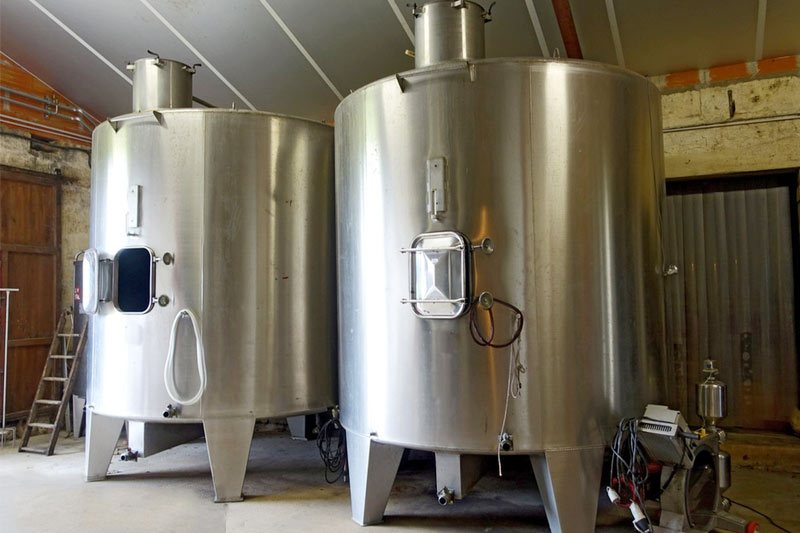So, you’re thinking about diving into the world of home brewing? Awesome choice! Crafting your own beer at home is not only satisfying but also a fun way to experiment with flavors and styles. But before you start, you’ll need some essential craft beer equipment. Don’t worry, it’s not as complicated as it sounds. Let’s break down what you need to get started.

Key Takeaways
- Start with the basics: a good brew kettle, fermenter, and some bottles.
- Sanitation is key. Clean equipment means better beer.
- A hydrometer and thermometer are must-haves for tracking your brew.
- Decide early if you want to bottle or keg your beer.
- Consider advanced gear like wort chillers as you get more into the hobby.
Choosing the Right Fermentation Equipment
Types of Fermenters
When you’re starting out in home brewing, picking the right fermenter is a big deal. Fermenters are the vessels where your wort turns into beer, and they come in different materials and styles. You might start with a basic plastic bucket or a glass carboy—both are great for beginners. However, when selecting a home brewing kit, it’s crucial to prioritize a fermenter made from food-grade plastic, glass, or stainless steel to ensure safety and maintain the integrity of the brewing process. Over time, many brewers upgrade to stainless steel fermenters because they’re durable and easier to clean. Plus, they often come with handy features like conical bottoms for collecting yeast and ports for sampling.
Importance of Airlocks and Bungs
Airlocks and bungs are small but mighty components in the brewing process. An airlock allows carbon dioxide to escape during fermentation without letting any unwanted air or contaminants in. This is important because pressure build-up could otherwise cause a nasty mess. The bung helps secure the airlock to the fermenter. Without these, you might end up with a lid popping off or worse, a messy explosion.
Using Carboys for Fermentation
Carboys are a popular choice for fermentation due to their transparency, which lets you see the fermentation process in action. They’re typically made of glass or plastic. Glass carboys are great because they don’t scratch easily, reducing the risk of contamination. However, they can be heavy and fragile, so handle with care. Plastic carboys are lighter and less prone to breaking, but they can scratch more easily, which might lead to bacteria hiding in those scratches.
Essential Brewing Tools for Every Home Brewer
The Role of Brew Kettles
Every home brewer needs a reliable brew kettle. It’s where the magic starts, transforming water, malt, and hops into the wort that will eventually become beer. A good brew kettle should have enough capacity to handle your batch size comfortably. It’s big enough for a 5-gallon batch, which is a standard starting point for many home brewers. Make sure your kettle is made of stainless steel or aluminum for even heat distribution and durability.
Selecting the Right Heat Source
Choosing the right heat source is crucial for an efficient brewing process. If you’re brewing smaller batches, your kitchen stove might do the trick. But for larger volumes, you might want to consider a propane burner or an electric brewing system. These options provide more control over the heat, helping to avoid boil-overs and ensuring a consistent boil. Remember, the goal is to bring your wort to a rolling boil as quickly as possible.
Using Siphons and Tubing
Siphons and tubing are essential for transferring your brew from one vessel to another without making a mess. An auto-siphon is a handy tool that simplifies this process, creating a vacuum to move the liquid smoothly. Tubing should be food-grade and the right size to fit your siphon and other equipment. This setup is especially useful when moving your beer from the fermenter to the bottling bucket, ensuring minimal exposure to air and contaminants.
Brewing your own beer at home is a rewarding hobby that combines creativity and science. By equipping yourself with the right tools, you set the stage for crafting delicious brews that you can proudly share with friends and family.
Sanitation and Cleaning: Keeping Your Equipment Pristine
Importance of Sanitizers
Brewing great beer starts with clean equipment. Sanitizers are your best friend in this process. They make sure no unwanted microorganisms spoil your brew. You can find homebrew-specific, no-rinse sanitizers at your local shop. Or, if you’re in a pinch, a simple mix of bleach and water can do the trick, just make sure to rinse well afterward. The right sanitizing products can make all the difference in your brew day.
Choosing the Right Cleaners
When it comes to cleaning, not all products are created equal. It’s tempting to grab any dish soap, but unscented is the way to go. Scents can linger and mess with your beer’s flavor. Homebrew-specific cleaners are designed to tackle the grime without leaving a trace.
Here’s a quick list of cleaners you might consider:
- PBW (Powdered Brewery Wash)
- Sani-Clean
- Star San
Avoiding Off-Flavors with Proper Cleaning
Off-flavors are the bane of any home brewer. They sneak up when you least expect them and can ruin a perfectly good batch. Proper cleaning is your best defense. Make sure every nook and cranny of your equipment is spotless. Pay special attention to areas like the spigot and tubing, where residue loves to hide.
Remember, a clean brewery is a happy brewery. It may seem like a chore, but the payoff is worth it when you pour that first perfect glass.
Keeping your equipment pristine is not just about the taste; it’s about the satisfaction of knowing you’ve done everything right. And hey, if you enjoy the process, that’s just a bonus.

Measuring and Monitoring: Tools for Precision Brewing
In the world of home brewing, precision is key. Getting your measurements right can mean the difference between a good brew and a great one.
Using Hydrometers for Gravity Measurement
A hydrometer is a simple yet essential tool for any home brewer. It helps you measure the gravity of your brew, which in turn tells you how much sugar is in the liquid. This is crucial for calculating the alcohol content of your beer. Without accurate gravity readings, you’re essentially brewing blind.
Here’s how you can use it:
- Fill a test jar with a sample of your wort or beer.
- Gently lower the hydrometer into the liquid.
- Spin the hydrometer to remove any bubbles that may cling to it.
- Take the reading at the surface of the liquid.
The Importance of Thermometers
Temperature control is another critical aspect of brewing. A thermometer allows you to monitor the temperature of your brew at various stages. Whether you’re mashing grains or boiling wort, having a thermometer on hand ensures you’re hitting the right temperatures for the best results.
- Digital thermometers offer quick readings and are easy to use.
- Glass thermometers can be more traditional but are just as effective.
- Consider a thermometer with a probe for more accurate readings.
Monitoring pH Levels
pH levels can affect the flavor and stability of your beer. Monitoring the pH during the brewing process helps you ensure that your beer will taste just right. You can use pH strips for a quick check or invest in a digital pH meter for more precise measurements.
“Keeping a close eye on these metrics can transform your brewing from a hobby into a craft.”
By understanding and utilizing these measuring tools, you are well on your way to crafting the perfect brew every time. Precision in brewing not only enhances the quality of your beer but also makes the process more enjoyable and rewarding.
Bottling and Kegging: Preparing Your Beer for Enjoyment
Choosing Between Bottling and Kegging
When it comes to packaging your homebrew, deciding between bottling and kegging can be a tough call. Bottling is the traditional route, and it’s great for those who enjoy sharing their brew with friends or storing it for later. However, kegging offers a quicker and more efficient way to get your beer ready for drinking. Draft beer from a keg often tastes fresher, and it’s less prone to oxidation, which can spoil your brew.
Essential Bottling Tools
If you decide bottling is your way to go, there are some must-have tools you’ll need:
- Bottle Brush: This is key for cleaning out any sediment that might ruin your beer.
- Bottles: Glass bottles are ideal, but make sure they’re not the twist-off type.
- Bottle Caps and Capper: You’ll need these to seal your bottles tight. A twin-lever capper is usually enough, though some folks prefer a bench-mounted model.
- Bottling Bucket and Filler: These help you transfer your beer from the fermenter to the bottle without a mess.
Kegging Equipment Basics
For those leaning towards kegging, here’s what you’ll need:
- Corny Kegs: These are the standard for homebrewers, offering a simple way to store and serve your beer.
- Kegerator or Keezer: A modified freezer or fridge to keep your kegs chilled and ready to pour.
- CO2 System: This is crucial for carbonating and dispensing your beer. It includes a CO2 tank, regulator, and tubing.
Once you’ve experienced the ease of kegging, you might find yourself wanting to expand your setup with a keezer, which can serve multiple kegs at once and double as a cold-crashing chamber. It’s perfect for those who love a good DIY project and want to take their homebrewing to the next level.
Advanced Equipment for the Enthusiast Brewer
Wort Chillers for Quick Cooling
After the boil, getting your wort to the right temperature fast is key. A wort chiller is a game-changer here. These devices, usually made from copper or stainless steel, help you cool your brew quickly, reducing the risk of contamination and improving clarity. You can choose from immersion, counterflow, or plate chillers, each with its own benefits. Immersion chillers are great for beginners because they’re easy to use and clean. Counterflow and plate chillers, on the other hand, are more efficient and suited for larger batches.
Upgrading to Electric Brewing Systems
For those looking to bring more control into their brewing process, electric brewing systems are the way to go. These setups allow for precise temperature management and can be a real time-saver. Imagine having a system where you can set your mash temperature and walk away, knowing it will hold steady. With home brewing systems, you can replicate or even surpass the quality of commercial brews right in your kitchen. Plus, they often take up less space than traditional setups.
Using Grain Mills for All-Grain Brewing
If you’re ready to step up your brewing game, consider investing in a grain mill. Milling your own grains right before brewing ensures freshness and allows you to experiment with different grain sizes, affecting the taste and body of your beer. Grain mills come in various styles, from manual to electric, and can be a worthwhile investment for those committed to all-grain brewing. Not only does this give you more control over your brew, but it also opens up a world of possibilities for creating unique beers tailored to your taste.
Optional Accessories to Enhance Your Brewing Experience
The Benefits of Using a Wort Chiller
If you’ve been brewing for a while, you know that cooling your wort quickly is crucial. This is where a wort chiller comes in handy. A wort chiller can save you a lot of time by rapidly bringing down the temperature of your brew, which is essential to avoid any unwanted bacterial growth. There are different types available, like immersion chillers and counterflow chillers, each with its own perks. Immersion chillers are simple and easy to use, ideal for beginners. Counterflow chillers, on the other hand, are more efficient but require a bit more setup.
Exploring Yeast Health and Temperature Control
Maintaining the right temperature during fermentation is key to keeping your yeast happy and your beer tasting great. Investing in a temperature control system can make a big difference. Yeast health is another critical aspect; using yeast starters or nutrient packs can ensure a healthy fermentation process. Temperature control devices, like a fermentation chamber or a temperature controller, help keep things steady. If your yeast is too hot or too cold, it might not ferment properly, leading to off-flavors.
Utilizing Pumps and Plumbing for Efficiency
For those looking to streamline their brewing process, pumps and plumbing can be a game-changer. They can help with transferring liquids between vessels without the need for manual siphoning. This not only saves time but also reduces the risk of contamination. Consider using quick disconnects for easy connections and disconnections. A pump can also assist in recirculating wort during the mash, helping to maintain an even temperature and improve efficiency.
Adding optional accessories to your brewing setup can significantly improve your brewing process, making it more efficient, enjoyable, and consistent. While they might seem like an extra expense, these tools often pay for themselves in convenience and quality improvements.

Wrapping It Up
So there you have it, the must-have gear for any homebrewer looking to craft some tasty brews right in their own kitchen. Sure, it might seem like a lot at first, but once you get the hang of it, you’ll wonder how you ever lived without a hydrometer or a bottling wand. Remember, brewing is as much about the journey as it is about the final product. It’s okay to start small and build your collection over time. And hey, if you ever get stuck, there’s a whole community of brewers out there ready to lend a hand. So grab your gear, pick a recipe, and get brewing. Cheers to your new hobby!
Frequently Asked Questions
To start brewing at home, you’ll need a large pot, a fermentation bucket with a lid and airlock, a siphon, sanitizer, a hydrometer, and bottles with caps and a capper.
Sanitation is crucial because it prevents unwanted bacteria and yeast from spoiling your beer. Using sanitizers keeps your equipment clean and your beer tasty.
Choosing a fermenter depends on your brewing style and batch size. Plastic buckets are great for beginners, while glass carboys offer better visibility and are good for advanced brewers.
A hydrometer measures the sugar content in your beer, helping you track fermentation progress and calculate alcohol levels.
Bottling is cheaper and doesn’t require much equipment, but kegging allows for easier storage and serving. Choose based on your budget and space.

